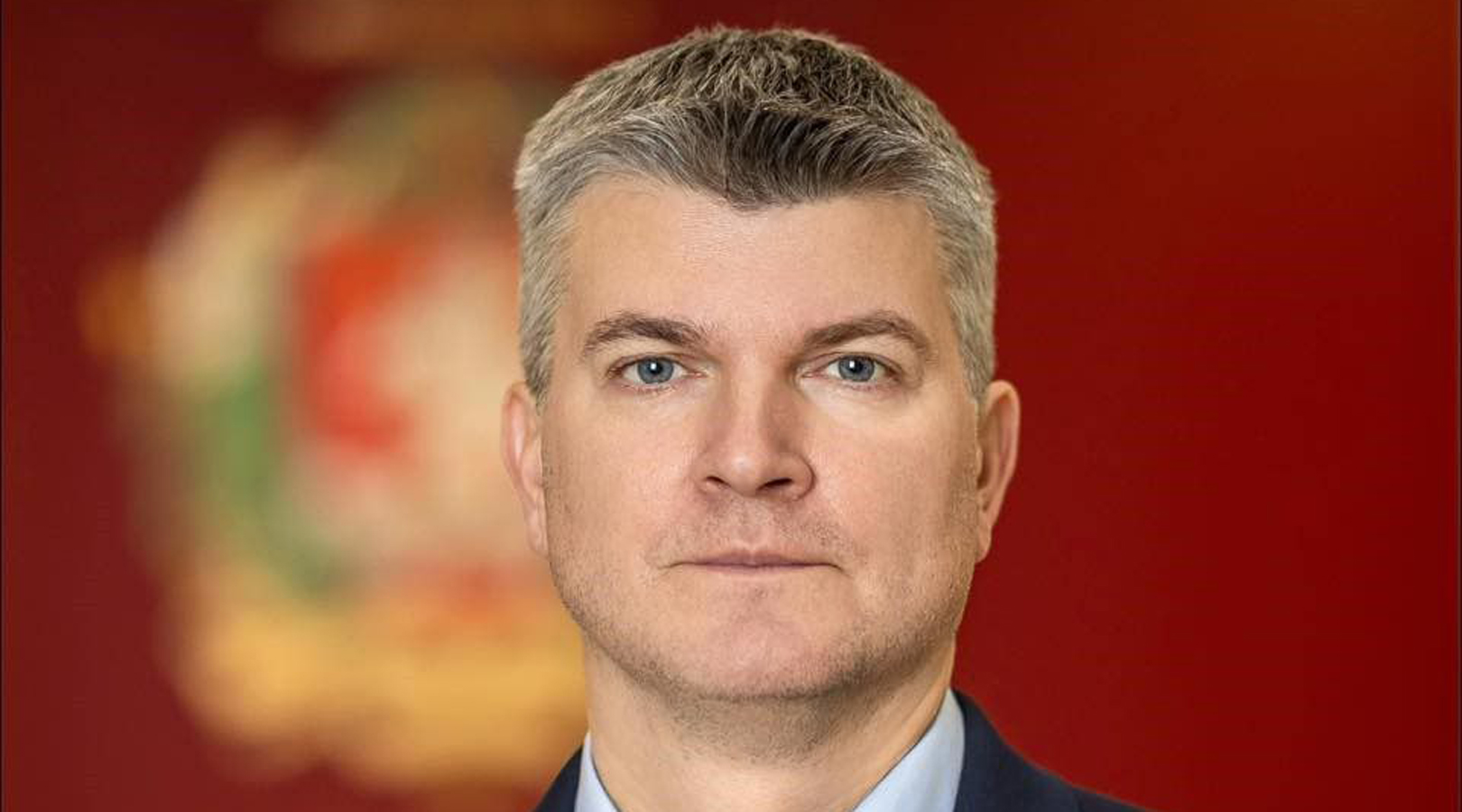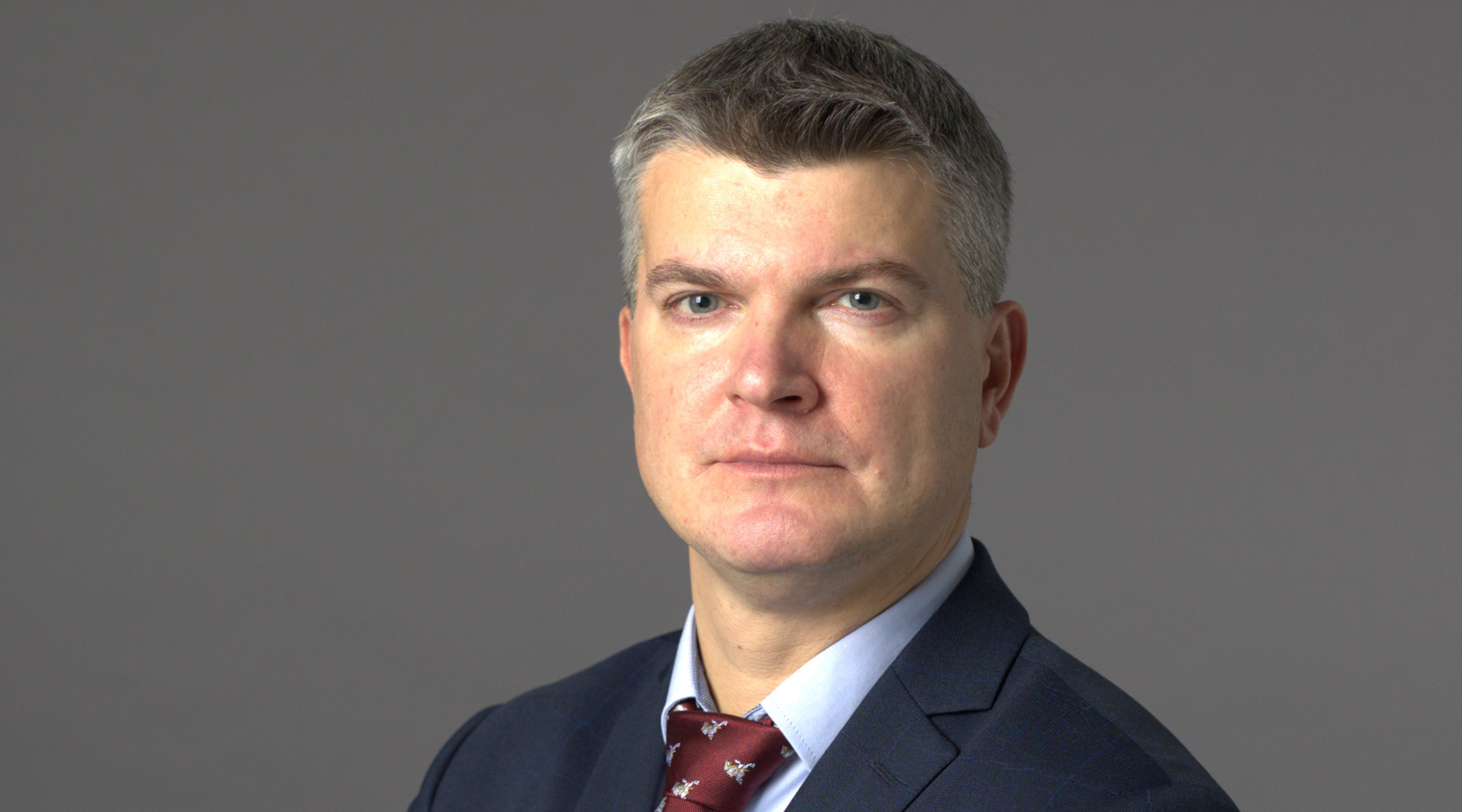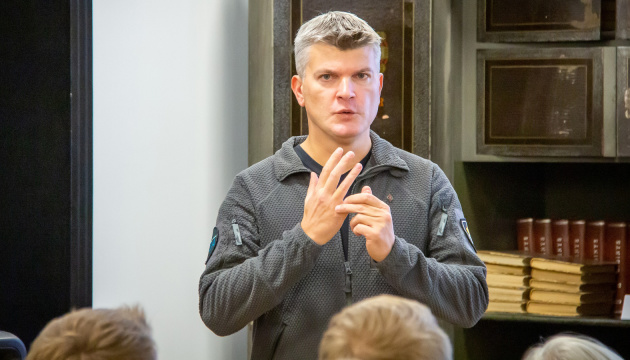Aurimas Navys is a retired officer of the Lithuanian Special Operations Forces with over 17 years of experience and one of the country’s leading experts on security and defense. During his active military service, he served as head of operations at the Lithuanian SOF headquarters and worked as a military advisor to the Deputy Commander of NATO Special Operations Forces at SHAPE headquarters.
Today, Aurimas Navys is a member of the Vilnius City Council and heads the Lithuanian Public Information Security Agency. He is also a co-founder of the Oleksandr Tereshchenko Foundation (named after the defender of Donetsk Airport and Hero of Ukraine), which supports Ukraine’s Special Operations Forces and assists with the reintegration of military veterans. In Lithuania, Navys is known as an expert who values honest and accurate analysis over self-deception, political correctness, or sensationalism.
In an interview with Ukrinform, he discusses whether Lithuania should expect heightened security risks during the Kremlin-announced joint Belarusian-Russian military exercises near the border, the specifics of Russia’s psychological operations against Lithuania, and the three key factors that could help Ukraine achieve victory.
THE RUSSIANS THOUGHT THEY COULD OCCUPY LITHUANIA LIKE CRIMEA
Mr. Navys, from your experience as a military, as a special operations expert, how do you evaluate the current security challenges that Russia poses to Lithuania and to the Baltic region?
I think the main security issue here in the Baltic states is the so-called hybrid operations or hybrid warfare. First of all, it is sabotages. And we’ve seen that in the Baltic Sea. Recently, we had like four or five cases in Lithuania with waste plants that uses waste and then produces heat or electricity where they were huge fires and, of course, things with Ikea – the huge corporation in Lithuania (an attack on an Ikea furniture store in May 2024).
So it’s sabotages. Second of all, it is diversion groups. If Russia would start some kind of a bigger operation, they could blow up something here in Lithuania. I mean, we have like in total over 100,000 people that came from Belarus and from Russia and Ukraine in the recent years and Lithuania is a small country. Our intelligence just don’t have such a manpower to check all of those people that are coming to Lithuania, so I think potentially some diversion groups are already here. Also Russia is using a narrative that war and culture have nothing in common. But actually, “Russkiy Mir” (“Russian World”) or Russian culture is an aggressive culture.
Also, we have this ongoing debate about Russian schools. In Lithuania, we have Russian schools and they have separate books for history. And if you teach young people false history, so then you can have an army of the “fifth column.” And now it’s another very dangerous thing – psychological operations. Usually, psychological operations are more about emotions being involved so let’s say all the stupid things about your president Zelensky being “a drug addict” or “Ukrainians crucifying children in Donetsk or Luhansk.”
And of course, we have direct military threats. We have two of our neighbors, unfortunately, the aggressive neighbors, Belarus and Russia, so we have borders with the countries that actually are in war, in aggressive war. They invaded Ukraine, they invaded Georgia. So it’s a very dangerous situation that we have. But I think the greatest danger here is exactly hybrid warfare and so-called soft power. It’s a very dangerous situation because Russia is trying every time to influence our elections. Every time. And you’ve seen that attempt in Romania.
You’ve seen that in Poland. You’ve seen that even in the United States, in Great Britain. So, in Lithuania, Latvia, Estonia, as we are small countries, it’s kind of much more easier for Russia to buy some electorate and not with money necessarily. You can buy it with all the stupid nonsenses. You can buy it with psychological operations. And they’re doing that since 2006.
It’s like, I think the main idea in Moscow and Kremlin about Baltic states before invasion in Ukraine was as of kind of Crimea. They presumably thought that they can occupy Baltic states using a fifth column and Russian-speaking population, giving them Russian fake passports, and then do the same operations, a “special operation” as we saw in Crimea.

Do you see any greater danger this autumn when there will be the so-called training with the Russian and Belarusian military forces? And how do you evaluate Lithuania’s decision to withdraw from the treaty on cluster munitions and from the international treaty banning anti-personnel mines? Do you see that the scenario of direct Russian military aggression against Lithuania is somehow realistic?
First of all, it’s a very good thing that we withdrew from the Ottawa Convention on anti-personnel mines plus the munitions treaty. I mean, yes they’re terrible. But having in mind the size of Russia and the size of our countries, we have to have some leverage. Unfortunately, you cannot do anything about that. Ukraine’s kind of big country and still you have lost 20% of your territory to Russia. And we are not in such a position as you are. I mean, even when you think about the width of territory, like 300 kilometers Russia crossed Ukraine’s border and moved within six to eight hours, 100, 150, 200 kilometers. So we do not have this luxury fighting a war with Russia, according to that kind of “peacetime rules.”
But actually, I think exercise “Zapad” is again part of Russian IPSO, it’s an information or psychological operation. Russia does not have enough manpower. Russia does not have enough soldiers. Russia does not have enough tanks. Now, just all that they have, they already deployed to Ukraine, with a small exception for, like, you know, border guards. Now, border guards are under FSB, not under military, but still, it’s a kind of part of military, according to Russian doctrine. So, Russia is just simply fixed on Ukraine. And actually, you are doing that. You fixed Russian forces in your country, and even not in your country, even in Russian Federation territory, like Kursk. So Russia cannot actually even think about doing some bigger military actions in Baltic states.
And the second thing is that we are a NATO member, so direct attack on any of the countries of Alliance means it’s an attack on NATO. I analyze Russia’s moves and 99 percent of whatever they say are lies, just simple lies, but sometimes they say truth and when war criminal Putin or war criminal Lavrov or other war criminals in Russia are saying that they don’t want to fight against NATO, they mean it. Russia being so-called “second army in the world” itself that’s just a joke. For three-and-a-half years, they cannot take strategic cities or towns in Ukraine like Pokrovsk or even Chasiv Yar, because they cannot control it. And the Ukrainian Special Operations Forces are still operating in Bakhmut (temporarily occupied since May 2023).
So of course, they think that if a direct attack on Baltic states in NATO would be seen as an attack on еру alliance, that would be it – Kaliningrad oblast, that’s now the biggest threat, it will be eliminated. Because that’s in every NATO plan, how to deal with Russia. So they don’t want to do that. But I already mentioned hybrid warfare. Because if you do such an operation, NATO Council, if these people may not see it as direct attack, then Russia would succeed. So that’s why I’m saying that the most dangerous thing is hybrid threats. So that’s very dangerous. Panic, sabotages, diversions.
And of course, immigrants, illegal immigrants. If you push them over the border, Polish or Lithuanian, from Belarus, you will have now a “full bucket of flowers.” How you can fight the sabotage? How can you fight the diversions? How can you fight the panic when people just flee from the city?
Luckily for us, and of course, unluckily for you, they cannot do that while they are fighting in Ukraine. Because, you cannot do just an information operation or hybrid operations and then do nothing. It’s stupid.
At the end of May, there were reports on social media that some people in Lithuania who are living near the Suwalki corridor are starting to leave that place. Was it also a part of Russian IPSO?
It’s IPSO. It’s simple IPSO. It’s the same what Russians did before they occupied Crimea.
I’m sorry to say that, but it was an excellent operation. Before actual occupation, Russians did the same. They were saying to the public that Ukrainians are fleeing from Crimea to Russia, that Ukrainian forces actually are changing sides, that even the generals and some from your Defense Intelligence or Security Service of Ukraine are changing sides and they’re fleeing to Ukraine. That’s not what happened in reality.
IN LITHUANIA, PEOPLE STILL THINK THEY LIVE IN PEACE, BUT IT’S AN ILLUSION
This year, Lithuania is expanding its military budget up to almost 4 percent of its GDP. Will it be enough? And does Europe still have enough time to regroup, to build more military plans, to introduce military innovations into new reality?
On the 2nd of June in Vilnius, we had this summit of nine countries of the Bucharest memorandum of 2015, together with Nordic countries and Ukrainian President Zelensky, as well as NATO Secretary General Mark Rutte. And what the NATO secretary general said is that all these countries – and, surprise-surprise, Hungary and Slovakia too – they agreed to spend five percent in the near future of its GDP on the defense budget. So of course, it’s better late than never. So, I think we are on a good way. And especially when this 150 billion rearm fund was agreed finally.
So these things are showing that Europe is opening its eyes. And Secretary General Rutte said also that we live in a very dangerous time and we have to realize that. Can we transform money into the soldiers and tanks and artillery? I don’t think so. It will take time. But what we can do, and Lithuania is doing that, the UK is doing that, other Baltic states, what we are doing, we are learning the lessons from Ukraine. A recent lesson with Operation Spiderweb – that’s just amazing.
So we are learning to use drones, to use technology, and to use mobile, small mobile groups, and also to be able to arm our citizens. If half of the population in Baltic states would have arms in their homes, like in Switzerland, we would have a different picture. If we would have drones, arms, grenades and all those things. Of course, it’s dangerous. But we have to realize the realities. The problem is that here, even in Lithuania, people still think that they live in peacetime. And what I’m saying is that the peacetime is an illusion. Yes, we are not fighting a conventional war like you – in trenches and artillery and tanks and fighters and all those things. But we are already in the informational war trenches.
And we live in that illusion of peace, and people just don’t want to open their eyes and see the reality of having neighbors like Belarus and Russia. But we have to act like a civilized world and do something about that. Like when you have a neighbor, the criminal neighbor, and that criminal neighbor who is beating up your other neighbors, raping women. And you are just sitting and saying: ‘Oh, how bad you see. Oh, don’t behave like that.’ It’s stupid. But, unfortunately, we are like that.

Considering this situation, do you think that the role of territorial defense in Lithuania will expand, because what was the part of how we stopped Russians is that this territorial defense people who were not that familiar even with the machine guns, but still were there to fight back…
Here in Lithuania, we call it the “Lithuanian Riflemen’s Union.” The problem is that, again, we have just very small numbers in the Riflemen’s Union that we call them combat-ready. And if it were to fight a war with Russia, they would be attached to our armed forces. Additional issue in Lithuania…and I’m saying that very openly because Russia knows that we just recently started to think about organized reserve. And organized reserve is very important. It’s the most important thing for the armed forces of a small country like Lithuania. I know, I know, in Ukraine it’s slightly different, because it’s a big country. You have a bigger population, you can mobilize people, and you have in your armed forces enough numbers of soldiers that, let’s say, could stop an enemy. But in Lithuania we have “the armed forces of one battle.” One battle, and that’s it. Of course, our professional soldiers are good. My comrades, my brothers-in-arms, we are training all the time. But we should think about the losses because we will have them. So you should think about how, after the first battle, you fight the second battle, the third battle, the fourth, and so on. Because without organized reserve, it’s just a dream that we can stop Russia.
So, because we know that, we started to work on that really heavily. And our new Minister of Defense, Dovile Sakaliene, she’s a really very intelligible woman, and she said that we have to build organized reserve like in Israel. You know again – when you are a small country and there are terrorists all around, you cannot just have professional armed forces. We also can look to our neighbor like Finland, they have a very robust organized reserve. And again, when we are talking about 4% or 5% GDP spending on the military budget or defense budget, we usually think about armed forces, about equipment, and maybe drones, technology. But we also have to think about organized reserve. I would say that this is a paramount question.
IT IS NECESSARY NOT ONLY TO SANCTION RUSSIA, BUT ALSO TO EMBARGO RUSSIA
We keep hearing about this peace treaty with Russia, and on the 2nd of June in Istanbul, our delegation was once again talking to the so-called Russian delegation, and we keep hearing these prospects, but there is no prospect of Russia being accountable for its war crimes. And do you think it’s even possible to talk peace with Russia without it being defeated on the battlefield?
No. And even if you defeat Russia on the battlefield, it is a terrorist country with nuclear weapons. Unfortunately, Russia will not capitulate. But if you defeat Russia in Ukraine, that’s just a very small step forward. You cannot win if you cannot defeat your enemy totally, like with Nazi Germany. I hope that in Western countries, people, diplomats and decision makers will see that. But to defeat Russia on the ground in Ukraine is obligatory. Without that, you cannot achieve anything. And then not only to sanction Russia, but to embargo Russia. Do you understand? It’s a difference.
Because now European countries with some other democracies over the world are supplying Russia, are buying resources from Russia. And every month we are supplying Russia with 4.5-5 billion euros. Every month. So, and if, for example, we are supporting Ukraine – I’m not talking about military support – we are supporting Ukraine with like 1-1.5 billion euros per month, how can you defeat Russia? There is no plan actually in Brussels, in Paris, in Oslo to defeat Russia. Because if you would have a plan, then you embargo Russia. And it’s a simple mechanics. And it’s already calculated. What you have to do is to ensure Russians get less than $4 per day per one citizen of the Russian Federation. If Russia had such an income, it would collapse. But now if the Russian budget is like $42 or $44 per day per one citizen, it’s more than 10 times bigger than we need to bring Russia down on its knees. Then without real economic sanctions, a real embargo and without the defeat on the ground in Ukraine, we cannot achieve the third and very important step to finally bring this last colonial empire down.
If we just go back to the first question of our conversation about Russian IPSO and one of their myths about a “crucified boy” – that “Ukrainian soldiers crucify children in Donbas”…Is that the same kind of narrative about Lithuania that they’re using?
I can give you one example. And I’m not sure if you know this person. It’s a psychopath. His name was Menshikov (prisoner and Wagner PMC member Dmitry Menshikov, who was eliminated during Russia’s war against Ukraine in November 2022). And he was one of Prigozhin’s killers. Actually, Putin awarded him with some kind of decoration. And there was footage from 2014-2015 on YouTube (that was later removed) of that Menshikov in Donbas, he was actually burning a swastika on one of the Ukrainian prisoners of war. And he was saying, “Это тебе за лабусов” (“This is payback for the Labuses”) (Labusy is a derogatory Russian slang term used to refer to Lithuanians). That is how Russians are calling Lithuanians – from “labas” which means “hello.” So when I saw that, I was just thinking, what, why? And then I realized that actually this was IPSO propaganda for us, so that we would be afraid of Russia.
Mr. Navys, thank you so much for this time and for this interview.
Thank you for contacting me. And it’s always a pleasure to connect with Ukrainians. You have been doing a great job for securing Europe and us.
Interviewed by Anna Kostiuchenko
Source: Aurimas Navys, head of the Lithuanian Public Information Security Agency




